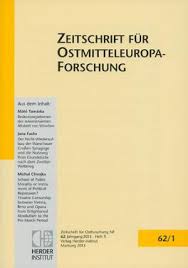Von der Freiheit eines Ratgebers im frühneuzeitlichen Russland
The Freedom of a Counsselor in Early Modern Russia
Author(s): Cornelia SoldatSubject(s): Political history, Social history, Modern Age
Published by: Verlag Herder-Institut
Keywords: Freedom; Counsselor; Early Modern Russia;
Summary/Abstract: Recent studies in the System of power in Early Modern Muscovy suggest that a boyar or counsellor defined his position in regard to his place within the hierarchy of the sovereign and his counsellors. This contradicts the often repeated myth of the autocratic Tsar, which derives mainly from reports by Early Modern voyagers into Muscovy and relies on proud Russians who tended to exaggerate their ruler's powers. Various sources as well as pictural representations, such as the murals of the Golden Hall in the Kremlin, speak of a balanced system of power within which the Tsar and his counsellors are more powerful together than alone, as Daniel Rowland points out. Within the God-given system of power a counsellor was supposed to give counsel not in respect of the Tsar's will, but in respect of how God's will on earth should be enacted by the Tsar. This is suggested by losif Volockij's magnum opus, the "Prosvetitel"' or "Enlightener", which may be regarded as a councellor's book like Western "Princes' Mirrors". A Princes' Mirror depicts an ideal Prince and compels the real Prince to model himself after this ideal image. An integral part of this is of course the counsel of his advisers, i.e. the very authors of the books in question. As authors of a Princes' Mirror, counsellors promote themselves within the system of power as well as their ideal model of a Prince. In losif Volockij's case the position of counsellor is not bound to a position as courtier, but may as well be tied to a monastic rank and effects his purpose through moral Instruction. The success of losif s successors suggests that the "Prosvetitel"' with his description of an ideal ruler in Muscovy became a counsel book for counsellors not only within the system of the sovereign and his counsellors, but also for moral advisers who positioned themselves at the periphery of that system to become a counselling instance of their own.
Journal: Zeitschrift für Ostmitteleuropa-Forschung
- Issue Year: 57/2008
- Issue No: 1
- Page Range: 23-33
- Page Count: 11
- Language: German

